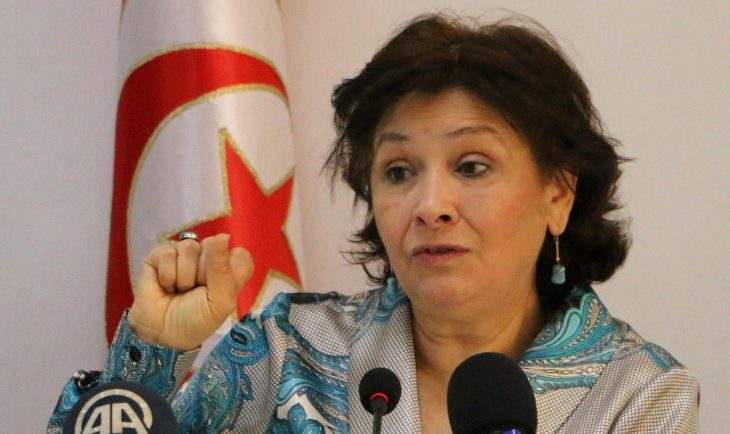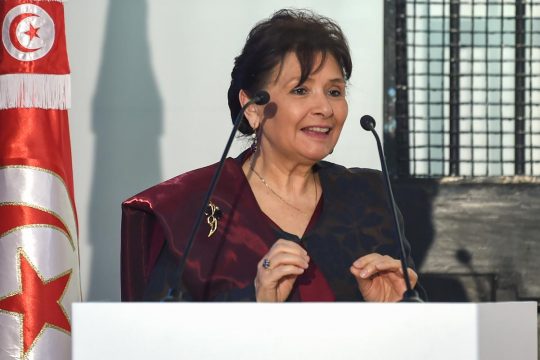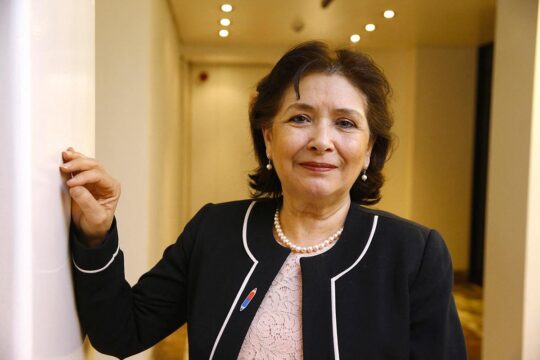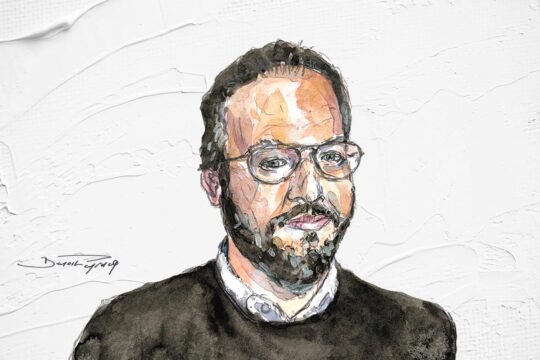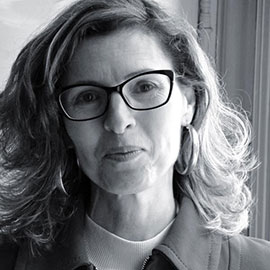JUSTICEINFO.NET IN-DEPTH INTERVIEWS
Sihem Bensedrine
Head of the Truth and Dignity Commission (IVD) in Tunisia
In Tunisia, the Truth and Dignity Commission (IVD) has just concluded its work with a final report of two thousand pages, not yet published in the Official Gazette and which the Tunisian government refuses to officially receive. His four and a half years in office were marked by many controversies. Its president, Sihem Bensedrine, returns for JusticeInfo.net on the obstacles crossed and on its recommendations, which the government should implement within one year, according to article 70 of the law on transitional justice.
JUSTICEINFO.NET: In the final report of the Truth and Dignity Commission (IVD) you describe with force the obstacles encountered during your mandate as president, which started in June 2014. Which were the most difficult to overcome?
SIHEM BENSEDRINE: Obstructions encountered with the head of state litigation in the context of the arbitration and conciliation commission, which prevented substantial sums from stolen money being retrieved into state coffers. This is frustrating for us, especially when we see the severity of the Tunisian economic crisis and the fall in purchasing power.
For the first time in the history of Tunisia we succeeded in establishing the organizational structure of the Interior Ministry by showing which departments formed the political police.
Another thing I regret very much is our sore lack of the documents needed to show that the Tunisian system was surprisingly like that of the Stasi [the former East German political police] in the way it set up denunciation networks. This was at the heart of the abusive system. Access to the archives of the political police would have allowed us to show how this practice deconstructs a society, dislocates it and destroys social and family ties. The archives that we obtained through citizens who managed to get their hands on police documents are unfortunately not enough to demonstrate this predatory practice. However, there is one reason for us to be satisfied: for the first time in the history of Tunisia we succeeded in establishing the organizational structure of the Interior Ministry by showing which departments formed the political police. In fact, political police were in two main departments: the Directorate General of Special Services (DGSS) and the Directorate General of Technical Services (DGST).
What I also regret is that State institutions, particularly judicial institutions, for which we have the greatest respect, have not understood transitional justice. I cite as an example the Administrative Tribunal, which treated the IVD as if it were a permanent institution. Procedures concerning us have been dragging on for five years, and are still not decided.
Another aspect that this court did not take into account is the IVD's legal obligation to continue its work and complete its mandate regardless of the obstacles. The law stipulates that a Commission member who is absent three consecutive and six non-consecutive times may be dismissed. We couldn’t remain hostage to the absentees. Commissioners failed to appear seven times yes, eight times. The Administrative Tribunal accuses us of having revoked them. And the Tunisian Parliament refused to replace the missing members.
Criminal justice has been our main ally. Completing the process now rests on their shoulders.
I realize that there is in fact a lack of understanding of the mechanisms of transitional justice. I see it when ministers come to protest that a person is being tried again before the specialized chambers: "Ah, this is the abuse of Sihem Bensedrine who wants to take revenge on such a person," they repeat, ignoring the law on transitional justice. Fortunately, other institutions have embraced what makes this justice so special, including criminal justice, which has been our main ally. Completing the process now rests on their shoulders.
You praise the criminal justice institutions and yet everyone has seen the incredible slowness of the specialized chambers, from which judges expert in transitional justice were moved at the start of the judicial season without asking for it. How do you explain that?
Overall, we believe that criminal justice has embraced the process. This does not mean that we consider everything perfect. Justice also needs to be reformed. In the report, we proposed certain reforms - through the establishment of the Higher Council of the Judiciary - so that the independence of the judiciary, which is now in its infancy, can be sustained over time and become deep-rooted. It is the culture of some judges, who are resorting to old reflexes and have not yet assimilated their independence, that is the problem.
To come back to the specialized chambers, let us not forget all the threats that have been made by police unions, who said they would not ensure the courts’ safety if they tried police officers. And the government hardly reacted. One judge resigned under pressure. The chambers have asked the Justice Ministry for better protection, which they have not yet obtained. When they issue summons for perpetrators, the judicial police sometimes fail to transmit them. Some judges had to issue warrants to move things forward.
In my opinion, the course of justice and transitional justice is well underway.
But I think we need to look at the whole dynamic and not just the problems. In my opinion, the course of justice and transitional justice is well underway. It is true it took a long time to get off the ground and we have not yet reached cruising speed, but we are seeing things today that human rights defenders did not even dare to dream about some time ago. Finally, the victims are no longer the ones being accused. And those who had power over people's lives and physical integrity are being summoned to court to answer for their crimes. These are strong signals against impunity. This proves that we are on track. We are moving forward.
Some Tunisian media still contest what you said in the report about huge sums of money you could have obtained if the head of state litigation had been willing to recover the public funds that were stolen...
Indeed, the State submitted 685 cases to the IVD as a victim of corruption. But along the way, the State refused to assert its rights. In an interview, I said that for the two cases of Sakhr Matri [son-in-law of former president Ben Ali] and Belhassen Trabelsi [Ben Ali's brother-in-law] alone, we could have had at least 500 million dinars from the former and one billion dinars from the latter [147,500 and 295,000 million euros respectively] on the basis of the files put on the negotiating table and processed by our financial analysts. We were unable to continue the negotiations within the framework of the arbitration commission, although Belhassen Trabelsi put twenty cases on the table at once. Just six cases concerning this brother-in-law of Ben Ali are worth 600 million dinars. He also wrote a five-page letter asking for forgiveness, showing a lot of sincerity. The authorities protested to us loud and clear in the media.
The question is why is the Tunisian State, given how indebted and in economic crisis it is today, refusing to recover its money?
The question is why is the Tunisian State, given how indebted and in economic crisis it is today, refusing to recover its money? Out of 685 cases, seven cases were successfully resolved where the State accepted the arbitration mechanism within the IVD. We then allowed it to recover 745 million dinars [220 million euros]. It must be said that at the beginning of our work, we were able to work with a head of state litigation, a judge of integrity, who signed an arbitration agreement. However, he was dismissed from his post while abroad on a mission to recover stolen money three months after he started collaborating with us. The ministry then remained for a year without a head of state litigation. It appointed an administrative officer under its authority whose action it dictated. He blocked the arbitration procedures with Slim Chiboub [Ben Ali's son-in-law]. From May 2016 to May 2018, the new head of litigation refused to enter into discussion even though his ministry had previously signed an agreement. When he pretended to negotiate, he always found a way to make the transaction fail. We registered 4,000 postponements of hearings with the head of state litigation during the four and a half years of our mandate. It was a tactic to stop arbitration. At the same time the authorities sought to oppress their enemies by trying to put them in prison and ensure that their friends paid a lot less money than they could have been asked.
Your arbitration negotiations have been taking place behind closed doors, so what about the truth?
The IVD may ask a person signing the arbitration procedure to testify at a public hearing. Ben Ali's nephew, Douraid Bouaouina, for example, refused to testify publicly at the hearings on customs corruption, so we stopped the arbitration and handed his case over to the courts. Imed Trabelsi agreed to speak openly. All those who have submitted a request for arbitration with the State have signed a form in which they undertake to testify publicly if requested by the IVD.
Ben Ali did not spill blood but killed slowly, inflicting more suffering on his victims. He took the whole society hostage, dislocating it and using insidious methods in his regime of violence.
In your view, what distinguishes the violations committed under Bourguiba from those committed under Ben Ali?
Bourguiba was more direct in the way he administered repression. When someone bothered him, he would send someone to kill them or sentence them to death. There were more murders under Bourguiba than during Ben Ali's regime. On the other hand, Ben Ali did not spill blood but killed slowly, inflicting more suffering on his victims. He took the whole society hostage, dislocating it and using insidious methods in his regime of violence. It forced family members to denounce each other, neighbours to become enemies, it punished human solidarity. He sued people who gave their neighbour five dinars because she didn't have anything to eat. A year in prison for such a small donation! It punished social conscience. This is why Ben Ali's crimes in terms of repercussions and damage on society are far more serious than those committed by Bourguiba. Today, the society we have inherited is very individualistic, materialistic and lacking in cohesion.
We got our hands on very important documents showing that from the first day Ben Ali set foot in Carthage, he began to benefit from the various mechanisms of corruption and embezzlement. He looted in an organized, inconspicuous way, never putting his hand directly in the till.
What allowed the corruption, nepotism and various fraudulent practices under Ben Ali?
There is a widespread myth among us, namely that Ben Ali was an honest dictator and that those who did the trafficking were the Trabelsis. Wrong! We got our hands on very important documents showing that from the first day Ben Ali set foot in Carthage, he began to benefit from the various mechanisms of corruption and embezzlement. He looted in an organized, inconspicuous way, never putting his hand directly in the till. He is like the godfather who monopolizes power, distributes money and receives his share and percentage from everyone. And as in any mafia system, there are some little free electrons who do not obey and who are punished. A case was transferred on 31 December 2018 by the IVD to the specialized criminal justice system, Case No. 61. It includes a key investigative file containing all cases of state corruption and racketeering related to Ben Ali and his relatives, some 30 accused in all. They had three main ways to steal public money. First, calls for tenders which were only signed when significant percentages were paid to the President in foreign accounts. Second, privatization of the most profitable companies, which they then sold to their relatives. This is how Marouane Mabrouk [Ben Ali's son-in-law and majority shareholder of Orange Tunisia] became exponentially richer. Thirdly, transfer of land. They reclassified land, and what was public became private through a well-honed system. The Ministry of State Domains was created by Ben Ali to manage this and his own properties.
In the report, you state that the reparations and rehabilitation programme for victims will not exhaust the State's resources, but could instead strengthen them. How?
The government has decided to set aside a ridiculous sum of only 10 million dinars [less than 3 million euros] for the Dignity Fund, which will be used to compensate victims. It has decided that the rest of the Fund's funding will come from the proceeds of arbitration, which it has blocked. But we still managed to get 745 million dinars. Other possible sources of funding include donations. Friends of our country and Tunisians living abroad are offering to contribute to the Fund. However, to date, no account number has been published by the government. It is the one that manages the Fund, not us. We are trying to explain to those in charge that they should not be afraid of the Dignity Fund, because it will be beneficial to the State, since many victims have decided to choose the life annuity instead of receiving the lump sum. And so they are asking that the State to pay the social security funds the money to which they are entitled, in a current context of total deficit of these funds, so as to receive an annuity in the long term.
This fund can also be replenished through reparations that can legitimately be requested from several parties. France is one of them. This country is implicated in the deaths of thousands of Tunisians.
This fund can also be replenished through reparations that can legitimately be requested from several parties. France is one of them. This country is implicated in the deaths of thousands of Tunisians, including those who died during the Bizerte War in 1961, nearly 5,000 victims. 300 to 350 people are military personnel who will be removed from the reparations claims, because for the military, death is one of the risks of their profession. But the rest are civilians. In July 1956, French troops pounded the mountains of the south, Agri and Djebel Bouhlel, from east to west, and killed a thousand people when Tunisia had been independent since March. This event also deserves reparations. In 1958, the French bombed the village of Sakiet Sidi Youssef. Claiming that the Algerians were taking refuge in our country, they gave themselves the right to pursue. I remember that at that time I was a child, a primary school student, and this attack shocked me. And then all the victims of Djebel Bargou. These are just a few examples. In the memo that we are going to make, we will list precisely the names of the victims and we will ask France to present financial compensation for these people according to our scale, namely 200,000 dinars per person killed.
Another party that we will solicit is the World Bank. It is responsible for the repercussions of the 1978 trade union crisis, in which the country's difficulties stemmed from the dictatorship of the World Bank, and the 1983-1984 bread riots.
Which are the facts revealed by the IVD that have shocked you most?
Three events. First, the nightmare of Sabbet Edhalem in the 1950s, a place where men were tortured, cut up and thrown into wells that were covered with lime to dissolve the bodies. Then when during the 1983-1984 bread riots 15- and 16-year-olds were arrested, tried and then spread around in Borj Erroumi prison. Instead of keeping them together, 34 young men were handed over to the adults for two years, like loot. They testified publicly before the IVD recalling how they slept at night with bloody pants on. Finally, the regime used violence in all its forms during the years of persecuting Islamists: not only do we attack the opponent, we rape his wife and children, we drag them into brothels by force. What they did is beyond comprehension.
BCE has everything to gain if he apologizes. It could restore his image, which is a bit dented with his party going to pieces, his son and all the rest.
Do you think the President of the Republic will one day be able to present apologies to the Tunisian people on behalf of the State, as your final report demands?
I think that President Beji Caïd Essebsi (ECB) is a statesman, despite everything that can be blamed on him in his management of human rights today and in the past. He is capable of such an act. BCE has everything to gain if he apologizes. It could restore his image, which is a bit dented with his party going to pieces, his son and all the rest. It's a way out through the front door. He can also choose not to apologize, and it must be said that his advisors are not up to their task. The president who succeeds him after the next elections would gain a lot in trust if BCE were to apologize to the victims. It would be an extremely strong symbolic gesture to strengthen social cohesion.
You have not yet been received by the head of government to submit the report to him?
No. By refusing to comply with the law, the head of government [Youssef Chahed] is showing that he is not up to the task. He is proving that he is not a statesman. That is why, in my opinion, his political future can only be shaky, in line with his incompetence and bias. Tunisians take a negative view of the fact that instead of focusing on issues of public interest, he is interested only in his personal and political future.
This is privatization of the state. The IVD and the new Constitution are against that.
Are you concerned about the non-publication of the report in the Official Journal of Tunisia?
The law is clear in this regard. Article 67 states: "The IVD shall make its report public, give it to the three presidents, distribute it as widely as possible and publish it in the Official Journal". Article 70 stipulates that "from the date of publication of the report, the government has one year to submit an action plan". Therefore, the official publication of the IVD report took place on 26 March 2019. In our regulations, it can be made available to the public in two ways. The first is the Official Journal and the second is the official IVD website. We are running a campaign to make the report as accessible as possible. Unfortunately, the Chahed government refused to publish it in the Official Journal. This is privatization of the state. The IVD and the new Constitution are against that.
An amnesty bill proposed by the government is circulating in the corridors of parliament. If it were adopted, would it not be the failure of the transitional justice process?
This is a disaster! It is a law that does not target the IVD, since the Commission has already produced its report and has transferred its files to the specialized justice system. This law, on the other hand, targets specialized chambers. In my humble opinion, this legislative proposal will not see the light of day, because it presupposes that the Constitution must first be amended before it can be adopted. In any case, they will not be able to do so before the election deadlines. This law is lamentable because it advocates impunity and ignores the rights and pain of victims. It deepens the social divide identified in our report.
What will you do after your term ends on May 31, 2019?
I myself do not know because I am in the process of disseminating and explaining the report! That's what's important to me right now. I don't want this work to be forgotten. What is certain is that I am not going to run for political office, I am not interested in that. I will probably take my place in civil society again to defend this young democracy, which is still threatened, still fragile, and especially to defend the reforms proposed by the report that the corrupt lobbies are trying to prevent from seeing the light of day.
Interviewed by Olfa Belhassine.
 SIHEM BENSEDRINE
SIHEM BENSEDRINE
Sihem Bensedrine, 68, has chaired the Truth and Dignity Commission (IVD) since June 2014. Graduated in philosophy at the University of Toulouse, she began a career as a journalist in Tunisia in the early 1980s mostly for independent or opposition publications. In 2008, she launched an independent radio station, Radio Kalima, which only obtained an FM frequency after the 2011 revolution. A human rights activist, she was one of the founders of the National Council for Liberties of Tunisia in 1998, which led her to be harassed by the Ben Ali regime until the fall of its regime. His term as head of the IVD expires on 31 May 2019.


